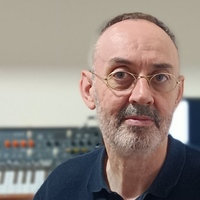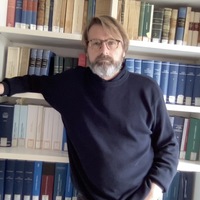Papers by Paolo Sommaggio
Positività giuridica.: Studî ed attualizzazioni di un concetto complesso, 2018, ISBN 978-88-6938-142-3, págs. 51-72, 2018

Neuroscience develops a particular idea of civilization: a neuro-civilization; whereby improvemen... more Neuroscience develops a particular idea of civilization: a neuro-civilization; whereby improvements of society are brought about by certain strategies. Firstly, through a definition of the role of the neuroscientists in Courts and Public debates. Secondly it creates new paradigms in these cultural debates about the structure of Society and the Law. And finally through reductive neuro-law characterized by the progressive substitution of traditional normative sources with new neuroscientific standards. Thus, the more the neuroscientific establishment justifies itself in its attempt to define standards of normality (for example), the more the possibility opens up of invasive interventions with unpredictable effects upon the patient, which stray perhaps involuntarily from the paradigms of direct intervention. Such questions mask a fundamental importance, since there is a risk that a certain neuroscientific idea of normality imposes itself not for deeper theoretical reasons, but for dang...
Ethics of Science and Technology Assessment, 2022
This paper discusses the emerging debate concerning the concept of Cogni-tive Liberty and its con... more This paper discusses the emerging debate concerning the concept of Cogni-tive Liberty and its connection with human rights. Therefore, considering how recent developments of neurosciences are granting us an increasing ability to monitor and influence mental processes, this article aims to provide a clear definition of Cognitive Liberty understood as a necessary condition to all other freedoms that cannot be reduced to existing rights. In this regard, after presenting the most important positions on the issue, we introduce our point of view, according to which Cognitive Liberty allows us to lay the groundwork for building new neuro-related Human Rights.
Neuroscience develops a “neuro-civilization” by certain strategies: definition of the role of Neu... more Neuroscience develops a “neuro-civilization” by certain strategies: definition of the role of Neuroscientists, new social paradigms (e.g. the concept of normality), substitution of traditional legal sources with neuroscientific standards. It may be a risk if a certain idea of normality imposes itself for current practices, not for theoretical reasons.

As the World Health Organisation declared Covid-19 a pandemic on March 11, 2020, WHO’s Director-G... more As the World Health Organisation declared Covid-19 a pandemic on March 11, 2020, WHO’s Director-General, Dr. Ghebreyesus, stressed the importance of a ready reaction from the states, directed at the containment of the spread of the virus, while also finding a “fine balance between protecting health, minimising economic and social disruption, and respecting human rights”. At the time of writing, with the total number of positive cases well within the 5-digit territory, the Covid-19 emergency has been putting the Italian health system to a severe test. Data recovered from the first two weeks of the Covid-19 outbreak show that about 1 in 10 of infected patients require intensive treatment in the form of ventilatory support, due to interstitial pneumonia characterised by severe hypoxemia, which is potentially reversible, but can result in a long, acute phase, and has lead to abnormal exploitation of intensive care units, whose maximum capacity has been severely challenged. It is in this...

This contribution deepens the following issue: whether the graphic-symbolic representation can be... more This contribution deepens the following issue: whether the graphic-symbolic representation can be used to account for that particular social and cultural phenomenon that is the education. We will present some geometrical images considered particularly suitable to represent and explain three distinct didactic models, which make up the pillars of an original formative theory that will be detailed. The triangle ordinarily intended to mean the concept based learning, hinged on the traditional lecture. The triangle by absence and “inverted,” a figure that outlines the problem based learning and its typically bottomup dynamics. The composite triangle illustrated by Gaetano Kanizsa, which springs from the overlap/opposition of the previous ones, shows the graphic representation of a socratically oriented educational model because it focuses on choice, choice based learning. Finally, the contribution will address the directional graphic dynamics that characterize and explain the three educa...
This paper discusses the emerging debate concerning the concept of Cognitive Liberty and its conn... more This paper discusses the emerging debate concerning the concept of Cognitive Liberty and its connection with human rights. Therefore, considering how recent developments of neurosciences are granting us an increasing ability to monitor and influence mental processes, this article aims to provide a clear definition of Cognitive Liberty understood as a necessary condition to all other freedoms that cannot be reduced to existing rights. In this regard, after presenting the most important positions on the issue, we introduce our point of view, according to which Cognitive Liberty allows us to lay the groundwork for building new neuro-related Human Rights.

It's well known that neurosciences are those disciplines characterized by the study of the re... more It's well known that neurosciences are those disciplines characterized by the study of the relations between the structure of the brain (and the nervous system) and the human behaviour. In this paper, I will analyse how the knowledge of the neurological structures tends towards the control of socially undesired behaviours, thus ending up with an authentic 'neuro-civilization'. Furthermore, I will show the role neuroscientists claim for themselves in the Courts of Justice and in cultural debates; moreover, I will analyse the so-called reductive neurolaw, which is the gradual replacement of traditional sources of law with new neuro-scientific standards. Finally, I will present the elaboration of the concept of 'normality' as used in order to eliminate deviance and to directly intervene in the brain, with resulting critical issues for human autonomy and personal freedom. New techniques (on human brain investigation) open opportunities in regard to the capability to ...
Abstract: Taking the cue from research on the bioethical and biolegal debate surrounding access t... more Abstract: Taking the cue from research on the bioethical and biolegal debate surrounding access to genetic data from the 1990s, this paper explores the implications of the COVID-19 pandemic from a bioethical as well as biolegal point of view. At first, by illustrating some of the risks associated with measures for the containment and contrast of the spread of the coronavirus. Subsequently, by considering the implications of such measures on people as individuals as well as workers, and by discussing the legal implications of a potential sacrifice of privacy for safety, as opposed to necessity and public interest. In this sense, the concept of genetic counseling initially proposed by Sommaggio (2010) is resumed and updated. Keywords: COVID-19. Genetic counseling. Bioethics. Biolaw. Fundamental rights.
There are many different conceptions of human in geneties: human could be considered as an object... more There are many different conceptions of human in geneties: human could be considered as an object, a social enhancement plan or a social consumer plan. The laek of a shared model calls lar a meditation over transitional mankind. The continuous modification allows us to recognize humanity in the difference between a rational image of self and what (or who) this icon creates. This is the motionless point between self-construction and self-transcending, both endless.

The paper introduces the educational project on the debate named "A suon di parole". It... more The paper introduces the educational project on the debate named "A suon di parole". It is a project that started in 2010 following a collaboration between the Faculty of Law of the University of Trento and IPRASE (Provincial Institute for Research and Educational experimentation of the Autonomous Province of Trento, Italy), and over the years the Cities of Trento and Rovereto subsequently joined. This collaborative project aims to develop, in a fun and competitive manner, the ability of high school students to argue and counterargue. In a healthy debate intended to develop their logic, reasoning and critical thinking. To do this, debate tournaments have been organized, in which intellectual games were played, along with structured arguments and counterarguments. As a result, it was observed how the dialectical confrontation, lived as a sporting competition, was able to promote in young people the desire and the capacity to compare their own reasoning with those of others ...

italianoL'Italia e un osservatorio privilegiato per confrontare il modello processuale accusa... more italianoL'Italia e un osservatorio privilegiato per confrontare il modello processuale accusatorio e quello inquisitorio poiche ha adottato un modello processuale del tutto originale. Da11989, infatti, e stato progressivamente introdotto nell' ordinamento italiano un modello processuale ispirato al modello adversarial: prima nella sola procedura penale e paz; ne11999, in tutti i tipi di processo (grazie alla ri/orma dell'art. 111 della Costituzione). Tuttavia questo modello e stato adattato, attraverso una serie di aggiustamenti, ad una realtd per malta tempo legata ad un modello inquisitorio. Questa novitd ha inciso moltissimo nella cultura giuridica ma anche nella cultura dilfusa dell'ltalia di questi anni poicbe l'opposizione tra le parti (in Italia chiamata "contraddiuorio") viene presentata come un bene da tutelare e custodire e non piii come un problema da evitare. Purtroppo, nell'ambito della esperienza giuridica concreta, il ualore ad oggi a...

In this paper, we analyse the structure of evolving moral dilemmas with an eye of regard for the ... more In this paper, we analyse the structure of evolving moral dilemmas with an eye of regard for the increasing importance of the role of artificial intelligence in such context. Starting with the analysis of the famous trolley problem experiment as formulated by Philippa Foot, we consider subsequent variants of this moral dilemma conceived throughout the years, culminating with formulations of the trolley problem concerning artificial intelligence, in which self-driving vehicles will have to make life or death decisions autonomously. In doing so, we investigate the basis for the construction of dilemmatic questions both for humans and machines by considering the problem from a philosophical, social and neuroscientific perspective. After considering and analysing the trolley problem in utilitarian and deontological terms, we follow Rittel and Webber’s footsteps, by highlighting the fallacies of the deontological and utilitarian traditional ‘one-right-answer’ approach, where a solution i...

Social Science Research Network, 2014
Italy is in a special position from which to observe the comparison between the accusatorial and ... more Italy is in a special position from which to observe the comparison between the accusatorial and the inquisitorial models, because it has adopted a highly original procedural form. Since 1989, a model drawing its inspiration from the adversarial procedure has been progressively introduced into the Italian inquisitorial judicial system. At first it has been used solely in trials; then, from 1999 it has been extended to all judicial proceedings (as a result of the reform of article 111 of the Constitution). This new introduction cuts deep not only into the judicial culture but also into current Italian culture, because the adversarial principle (in Italy called contraddittorio) was presented as a benefit to be safeguarded and maintained, and no longer as a problem to be avoided. Unfortunately, within the sphere of actual judicial experience the value attributed to the adversarial model mainly consists in a sterile dramatisation of facts. The purpose of this research paper is to explai...
Questo scritto tratta alcuni aspetti caratteristici del dono nella società giapponese. Nello scam... more Questo scritto tratta alcuni aspetti caratteristici del dono nella società giapponese. Nello scambio del dono, l'oggetto conferito e gli agenti che vi partecipano si trasformano in simboli e la relazione che li lega può essere avvicinata al linguaggio, al logos.











Uploads
Papers by Paolo Sommaggio